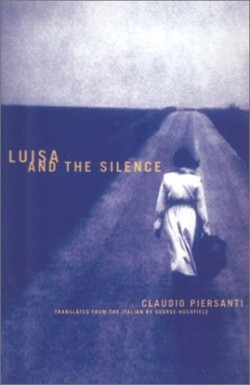Luisa and the Silence
“Only to a few, and they are very few, does an extraordinary life come; all the others must be satisfied with what they have.” Luisa, an aging accountant for a toy firm in Italy where she lives, deems herself satisfied with her ordinary life. She rises each morning to a cold apartment, showers and dresses quickly, then rides off to work in a car pool with several of her fellow employees.
But even an ordinary life has its extraordinary moments and Luisa at sixty is about to begin to experience hers. Some are pleasant-like the moments spent doing the personal accounts of her boss in the comfortable atmosphere of his home, returned each time to her flat in the luxury of his chauffeur-driven car. But most extraordinary moments are unpleasant, such as the instant she realizes she has made a big mistake in the business accounts, or the moment she can no longer ignore the mole on her chest, or the thump of fear in her body when she answers the ringing phone and no one is there. These moments pile one upon another until Luisa is struggling to deny the extraordinary and her accompanying fears, and return to the ordinary.
The author, an Italian novelist and screenwriter, has painted a dark picture of an aging woman whose battle to remain normal is slowly lost to age, retirement, declining health, and loneliness. It is not one to read for light entertainment. Written totally from the viewpoint of Luisa, the book drags the reader along on her descent into illness and dementia. “While she was alone, battling against fear, which at a certain point went out of her and into the objects surrounding her. The ashtray became strange. The pen next to the telephone made her cry. Her red lighter disgusted her. Her body was alien, her house, the city itself.”
Luisa’s fear and her silent, solitary struggle with it move her life out of its routine, beyond the normal. But through the darkness of her dementia, Piersanti illuminates the extraordinary - both good and bad - lying in wait in any human life.
Disclosure: This article is not an endorsement, but a review. The publisher of this book provided free copies of the book to have their book reviewed by a professional reviewer. No fee was paid by the publisher for this review. Foreword Reviews only recommends books that we love. Foreword Magazine, Inc. is disclosing this in accordance with the Federal Trade Commission’s 16 CFR, Part 255.

